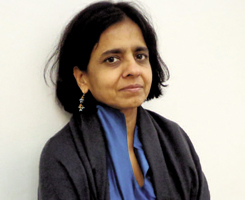
I HAVE ALWAYS REJECTED THE IDEA OF GENDER DISADVANTAGE. IF I DID ANYTHING LESS WITH MY LIFE IT WOULD BE A DISSERVICE TO MY MOTHER
When people ask me how I face difficult situations at work, I think of my mother and the strength it took her to overcome the challenge of bringing up four daughters singlehandedly,” says writer and environmentalist Sunita Narain. She recalls how she was eight when her father, Raj Narain, passed away and her mother was left with four daughters to bring up. She, against odds that also included going against the norm of a widow working in those times, took up her husband’s handicraft export business and fulfilled all our requirements. “This is the reason why I have always rejected the idea of gender disadvantage. If I did anything less with my life it would be a disservice to her,” she adds.
Narain’s diminutive figure belies the work she has done over the years. Her involvement with environment began with the Chipko Movement, while still in school. She happened to go to a conference in Delhi to discuss the movement where she met two other students from different Delhi schools with similar interests. They formed a student organisation called Kalpvriksh — the tree of life — in the field of environment. This organisation and its work took them into the Himalayas, where they saw the connection between livelihoods and environment. that environment was about development, about survival. People depended on it — land, water and forests — and without it, poverty would never be eradicated. I learnt that rejuvenating this natural asset was the way towards better economic growth. This gave me the motivation to pursue this work,” she says.
Today, Narain’s accomplishments and accolades in the field of environment are not just formidable but highly impressive as well. She is directorgeneral CSE, director of the Society the loss of tigers in Sariska. She was also a member of the Prime Minister’s Council on Climate Change as well as a member of the National Ganga River Basic Authority, which were set up to implement strategies for cleaning the river.
An untrained and inexperienced Narain learnt everything about environment and working for the conservation and preservation of the same, from scratch. “CSE was a small organisation with just four or five people so I had to, perforce, learn to do everything: from marketing to sales to even postage. This was an invaluable experience. It prepared me for taking on the management of the organisation, and I also learnt from my mistakes, which still holds me in good stead,” says Narain.
If in her growing up years she derived inspiration from her journalist grandfather Sri Krishna, who had a keen interest in gardening, CSE’s Anil Agarwal gave her direction to pursue her interest in all things environmental. “In 2001, Agarwal lost his long battle with cancer. He was committed to the cause even till his last moments and it is his passion that keeps me motivated even today,” she says. Due to her husband’s ill-health, Narain had already begun running CSE but “Anil, with his formidable personality and environmental consciousness, was hard to replace,” she remembers. But she has managed, and how!
In 2002, the Supreme Court accepted the CSE’s demand for a transition to CNG following their campaign for right to clean air. “The transition happened and Delhi could see stars in the sky once again. This is also when I understood that Anil had left behind a powerful institution. And this institution had to keep making a difference,” she recalls.
Next was the issue of pesticides in bottled drinking water. The revelation that companies were not testing and cleaning the groundwater being bottled created uproar. The larger furore was when CSE began testing soft drinks and beverages for pesticides. That shook not just the companies but the country, too. “But the two ‘battles’ not only forced me to think on my feet and work with my colleagues but also compelled me to lead from the front,” remembers Narain.
But has she ever been scared of taking on bigger issues and challenges and has being a woman made the fight harder? Not really! “I strongly believe that we must not only remain committed to our convictions but also stay open to the ideas and positions of others. We cannot personalise issues,” she feels. According to her, courage in her and people like her comes from the conviction that they are not doing anything wrong. “And no I don’t get intimidated because I am working in a male-dominated industry. I do have to work harder to constantly prove my credentials and worth, but it also means that I cannot take my work for granted,” she says.
A self-confessed workaholic Narain’s work usually takes up the bulk of her time, but that does not mean she does not let her hair down and enjoy life. She runs, swims, read and hopes that she will, at some point, begin to travel. “As I grow older, I think of the way my mother lived her life to the fullest. That makes me want to do more to get the right balance between work, family and friends. I don’t think I have got that balance right yet, but there is still time,” she smiles.
For many youngsters today, Narain is an icon — someone they would like to emulate. So what would she like to tell all those eager youth out there who want to be the next Sunita Narain? “Learn from your mistakes. Believe strongly in your convictions, and have the courage to think differently and challenge the norm,” she says, signing off.
